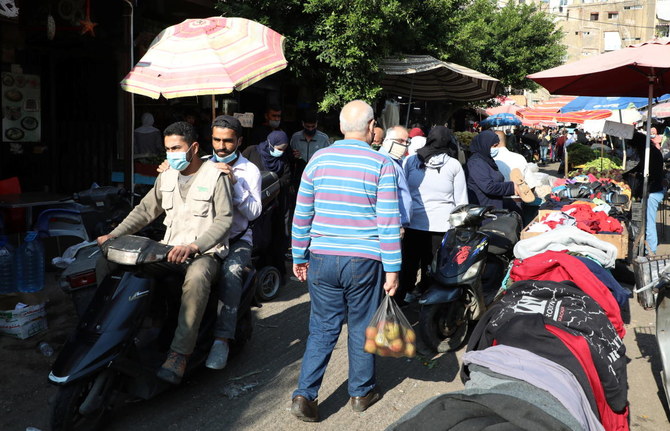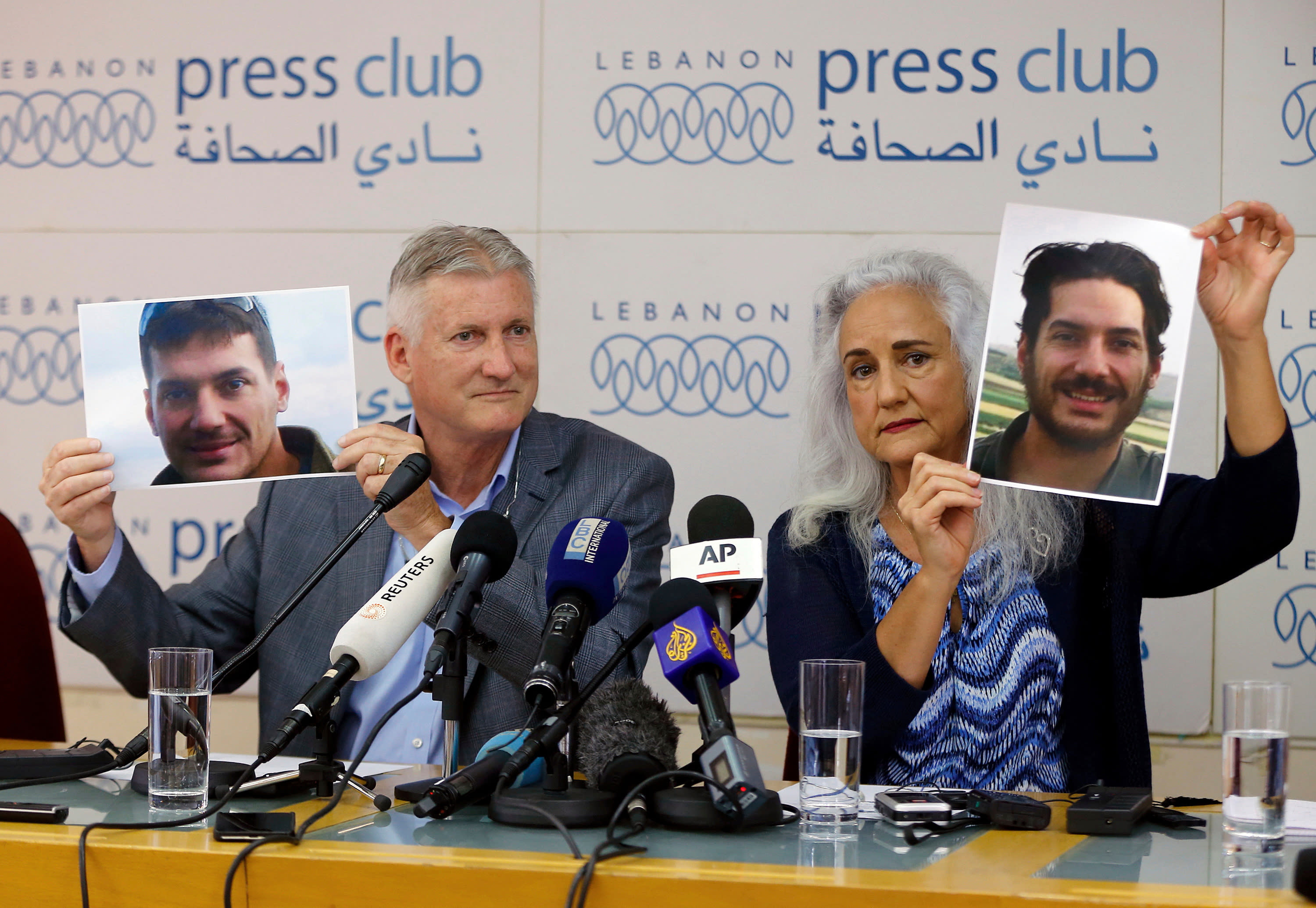
by NAJIA HOUSSARI -- arabnews.com -- BEIRUT: Lebanese army helicopters this week began dropping leaflets over city neighborhoods warning residents to observe the lockdown, which includes a 5 p.m. evening curfew. “Remain quarantined at home, COVID-19 is no joke,” the flyers read. Caretaker Prime Minister Hassan Diab said the lockdown will last until the end of the month. “We have reached a critical period regarding the spread of the virus and are left with no alternative,” he said. Lebanon has recorded up to 1,000 daily infections since Saturday. More than 106,440 cases have been reported since the outbreak began in February, while the death toll now stands at 827. “More time is needed to study the results of the lockdown. We will reevaluate the lockdown decision on Friday in order to allow more sectors to resume their activities,” Mohammed Fahmy, interior minister in the caretaker government, said. The rate of compliance with the ministry’s health directives stood at 85 percent, he added.
Fahmy urged private companies and businesses to develop work schedules that will allow employees to return to their homes without risking fines. Security patrols have issued more than 10,000 penalties for violation of lockdown rules since the outbreak began. Breaches included opening shops not included in the exemptions, failure to wear a face mask, and ignoring the night curfew and odd/even number plate rules. Concerning the rate of COVID-19 in jails, Fahmy said that “three weeks ago, more than 500 prisoners were infected, but today there are only 69 cases, one of whom has had to be hospitalized.” Security forces also issued a warning following the discovery of large numbers of fake press passes produced by drivers during the curfew. Many of the forgeries claimed to be linked to bogus electronic news sites. A security source told Arab News that “the holders of these passes were not media, which are excluded from the lockdown.” Security forces have detained a person believed to have issued dozens of fake press passes in exchange for money. “The arrested person has previously obtained passes for dozens of electronic news sites over the years,” Joseph Al-Qusaifi, the Lebanese Press Syndicate chief, said.
by AFP — BEIRUT: Lebanese have poked fun at outgoing interior minister Mohamed Fahmi after he suggested the solution to a ban …
BEIRUT (AP) — A top Lebanese security official said Saturday that he visited Syria for two days to speak with officials there about American journalist Austin Tice, who has been missing in the war-torn country since 2012. Maj. Gen. Abbas Ibrahim did not give further details in an interview with the local Al-Jadeed television channel, but his comments came two weeks after his return from Washington where he is believed to have discussed Tice’s case with U.S. officials. “After my visit to Washington, I went to Syria for two days and discussions over this matter are continuing and will continue,” Ibrahim said, referring to Tice’s disappearance. Tice, of Houston, Texas, disappeared at a checkpoint in the contested western Damascus suburb of Daraya on Aug. 14, 2012. A video released a month later showed him blindfolded and held by armed men. He has not been heard from since.
Tice is a former U.S. Marine who has reported for The Washington Post, McClatchy Newspapers, CBS and other outlets, and disappeared shortly after his 31st birthday. Ibrahim’s comments came as the Lebanese daily Al-Akhbar reported Saturday that the U.S. Congress could impose sanctions on him, under a new bill being considered. Ibrahim in recent years has helped to facilitate the release of a U.S. citizen held in Syria, and a Lebanese-American who was held in Iran. The U.S. has imposed sanctions in recent months on Lebanese politicians including allies of the militant Hezbollah group. Washington has listed Hezbollah as a terrorist organization since 1997 and sees the group as a proxy for its archenemy Iran in the region. Ibrahim said that U.S. sanctions wouldn't stop him from working on Tice's case. “I have promised Austin Tice’s mother whom I met in Washington and speak with her by telephone on a daily basis that neither sanctions nor anything else will affect work over the case of her son," he added.
by arabnews.com -- NAJIA HOUSSARI -- BEIRUT: Student elections in Lebanese universities have always been an indicator of political parties’ ability to attract the new generation to their ranks. But the triumph of independents in recent elections at the American University of Beirut (AUB), the Lebanese American University, St. Joseph University and Notre Dame University — Louaize suggests that something has changed. “There’s a major shift in students’ mindset and in the issues they find pressing. They harbor anger toward the system that governs their country,” Dr. Talal Nizameddin, the AUB’s dean of student affairs, told Arab News. Students have described the results of these elections as historic. Political parties “have lost students’ confidence in them,” Dr. Ziad Abdel Samad, social affairs expert and former secretary-general of the Lebanese Association for Democratic Elections, told Arab News.
The parties “are unable to reach” students, he said, “either due to the absence of on-campus life in universities because of the COVID-19 pandemic, or due to the changing mindset of the youth, who are monitoring the role of parties in power, their corruption, and the economic and social crises they led the country to.” He added: “The biggest question remains: Is this shift among university students an indication of a shift in the mindset of all the Lebanese? Meaning, will the independents or partisans win if parliamentary elections are held?” Mohammed Mansour, the Progressive Socialist Party’s youth commissioner, told Arab News: “The revolution and protests have weakened all parties in Lebanon without exception. But the revolution hasn’t presented a clear, consistent program that guarantees a transition toward real change.”
Khazen History


Historical Feature:
Churches and Monasteries of the Khazen family

St. Anthony of Padua Church in Ballouneh
Mar Abda Church in Bakaatit Kanaan
Saint Michael Church in Bkaatouta
Saint Therese Church in Qolayaat
Saint Simeon Stylites (مار سمعان العامودي) Church In Ajaltoun
Virgin Mary Church (سيدة المعونات) in Sheilé
Assumption of Mary Church in Ballouneh
1 - The sword of the Maronite Prince
2 - LES KHAZEN CONSULS DE FRANCE
3 - LES MARONITES & LES KHAZEN
4 - LES MAAN & LES KHAZEN
5 - ORIGINE DE LA FAMILLE
Population Movements to Keserwan - The Khazens and The Maans
ما جاء عن الثورة في المقاطعة الكسروانية
ثورة أهالي كسروان على المشايخ الخوازنة وأسبابها
Origins of the "Prince of Maronite" Title
Growing diversity: the Khazin sheiks and the clergy in the first decades of the 18th century
Historical Members:
Barbar Beik El Khazen [English]
Patriach Toubia Kaiss El Khazen(Biography & Life Part1 Part2) (Arabic)
Patriach Youssef Dargham El Khazen (Cont'd)
Cheikh Bishara Jafal El Khazen
Patriarch Youssef Raji El Khazen
The Martyrs Cheikh Philippe & Cheikh Farid El Khazen
Cheikh Nawfal El Khazen (Consul De France)
Cheikh Hossun El Khazen (Consul De France)
Cheikh Abou-Nawfal El Khazen (Consul De France)
Cheikh Francis Abee Nader & his son Yousef
Cheikh Abou-Kanso El Khazen (Consul De France)
Cheikh Abou Nader El Khazen
Cheikh Chafic El Khazen
Cheikh Keserwan El Khazen
Cheikh Serhal El Khazen [English]
Cheikh Rafiq El Khazen [English]
Cheikh Hanna El Khazen
Cheikha Arzi El Khazen
Marie El Khazen
